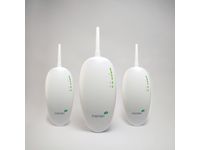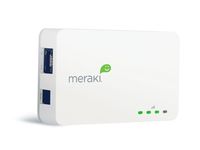Plug-and-Play Wi-Fi for Cities and Towns
Meraki hopes it can succeed where larger players such as Earthlink and Google failed: Making a business out of providing the infrastructure for citywide Wi-Fi systems.
The company’s new Main Street WiFi Starter Pack delivers everything a city or town needs to deploy broadband wireless access (802.11b/g) across an area of one square mile at a cost of just $10,000—that’s a fraction of what more typical commercial WiFi systems cost. And it even comes with a 60-day money-back guarantee.
How is Meraki able to deliver a system at such a low cost? The secret is Meraki’s mesh-network technology that enables each device in their network to operate as an all-in-one gateway, repeater, and access point. Deploying a network is as simple as connecting each module to a power source; once plugged in, the devices immediately communicate with one another to form a network. Increasing the network’s reach is a simple as plugging additional modules.
At minimum, one module must be hardwired to a network with a live Internet connection, but all the others can act as wireless repeaters as long as each link in the chain can reach another access point. You might think of Meraki’s network as hundreds of Wi-Fi hotspots that are all linked together to blanket a very wide area. What’s more, the mesh system allows cities to use multiple gateways from different service providers, eliminating the need for them to invest in a central network operations center.
Meraki’s data centers host all the required networking services, so that municipalities don’t need servers or IT departments to manage their networks. Meraki’s Pro Edition management software provides all the tools needed for monitoring, managing, and securing the network and includes an integrated billing system for cities that want to charge for access. The more advanced Carrier Edition software is available for an extra fee (Meraki doesn’t disclose pricing); it includes features such as prepaid card billing and “enhanced” branding.
Meraki built out a free wireless network in its home town of San Francisco that has grown to accommodate 165,000 users in the 18 months since its initial rollout. The City of Cambridge, Massachussetts deployed a Meraki system that covers 24 acres of public space at a cost of just $5,621. They needed only three of Meraki’s indoor units ($149 each) and 26 outdoor units ($199 each) to accomplish this.
The company started out as a Ph.D. research project at MIT focused on delivering inexpensive Internet access to the masses and already has customers in 125 countries. It is privately held and backed in part by Google and the venture-capital firm Sequoia Capital.
Get Tom's Hardware's best news and in-depth reviews, straight to your inbox.
-
ubuntun00b Can you do this with a wireless router? COMCAST Modem to AP to AP to AP to AP? If we can get a block party together, Im sure we all can get 12mbs for 10 bucks a month?Reply
The problem is the range. How the heck does radio signals travel so far? Huge antennas? If we as a city, and a people get together with one another, Im sure we can get service on our Streets and avenues for cheap right? Instead of offering service per household, we should get service for our whole street. Wouldnt that be sweet. -
nekatreven 99.9% percent of companies try and do this one of two ways.Reply
1. Use a variant of normal wifi gear that is hopped up on amps and huge antennas to form the mesh.
2. Use equipment that is actually designed for this kind of thing (motomesh and the like, and even they have issues).
Option number one ALWAYS gives you a shitty network. Option number two results in a cost per square mile that frightens the treasurers of even the most well off cities. Out of all the cities that have looked into this or tried it I've only ever heard of two that didn't crash and burn instantly.
No one will ever make a successful business out of trying this crap with just 2.4ghz equipment (and if they do they're just taking the money and running when the network turns out to suck).
and @ubuntun00b... No ones dsl or cable by itself is going to have enough bandwidth, and good luck using more than one connection on those proprietary, ISP provided modem/router/AP/voip combo boxes. Half the nodes wouldn't be able to get the built in wifi turned off and the stand-alone AP turned on. Even if they do you'll break SSL, vpn, and a whole slew of other things right out the gate.
Many smart companies have tried this planning for a good fiber pipe every other city or so and they failed...anyone adding that much load balancing on residential connections will only fail that much worse. -
jhansonxi You can do a lot of things with economy wireless routers by replacing the firmware with OpenWrt. There are many different protocols with trade-offs of performance and reliability under various loads:Reply
http://en.wikipedia.org/wiki/Wireless_mesh_network -
benjaminsebastian1 Check out Steve Pierce's blog, he's figured out how to make wifi work in a city: http://concentratemedia.com/blogs/posts/StevePierce2029.aspxReply -
Milleman Shouldn't this be possible by using just an ordinary WiFi router from Dlink, Linksys etc...?Reply -
I have a similar idea that could save millions. I use these D cell flashlights and color plastic wrap to create traffic lights that really work.Reply
I've got the cost down to $12 for a standard three signal light and plan to sell them to cities for $100 versus the thousands they spend today on those big clunky things you see everywhere.
OK - I'm yanking you and so is this vendor. 1st, wifi doesn't do outdoors in (proven by all the failed muni wifi systems), 2nd, cheap isn't a design criteria it's almost always a way to guarantee failure!
I predict we see this company out of business before the new year!

